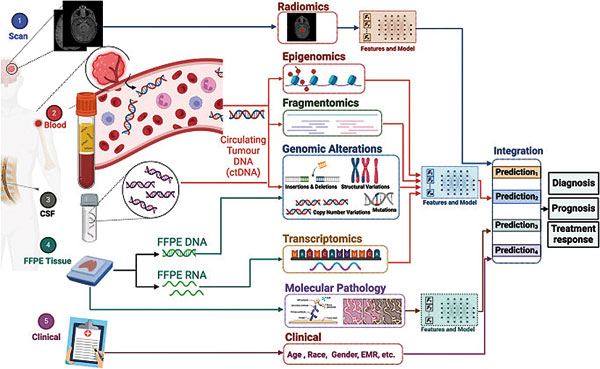Decoding Cancer: How Data Science is Personalizing Treatment and Saving Lives
View(s):Cancer is a disease that has challenged humanity for decades due to its complexity and variability. No two cases are the same, and this uniqueness makes treatment difficult. However, advances in science and technology, especially in Clinical Data Science, are transforming the way we approach cancer care. By integrating data from multiple sources and leveraging cutting-edge analytical tools, we are now on the brink of providing more personalised and effective treatments to cancer patients.
As a Clinical Data Scientist, my research focuses on harnessing data from a variety of medical and biological sources to improve cancer diagnosis, predict outcomes, and tailor treatments to individual patients. Let’s take a closer look at how this works.
Gathering Data from Diverse Sources
The foundation of this research lies in collecting and analyzing data from multiple aspects of a patient’s health and cancer. These include:
1. Medical Imaging (Radiomics): Advanced imaging techniques, such as CT and MRI scans, are more than just pictures. By analysing these images using algorithms, we can extract valuable information about a tumor’s size, shape, and texture. This is known as radiomics. These features can uncover details invisible to the human eye but critical for understanding the nature of the cancer.
2. Blood Tests (Circulating Tumor DNA or ctDNA): Tumors often shed fragments of their DNA into the bloodstream. By analysing these fragments, we can detect genetic mutations, structural changes, and other markers of cancer. This approach, often referred to as “liquid biopsy,” is less invasive and can provide real-time insights into the tumor.
3. Cerebrospinal Fluid (CSF): For brain and spinal cancers, analysing CSF can give us unique insights into tumor characteristics that are not captured in blood tests or imaging.
4. Tissue Samples: Biopsy samples from the tumor itself remain one of the most important sources of information. By studying the DNA and RNA from these samples, we can identify mutations, gene activity, and other molecular markers.
5. Clinical Data: A patient’s age, gender, medical history, and lifestyle factors all play a role in how cancer develops and progresses. This information is vital for creating a complete picture of the patient’s health.
Understanding Cancer through Data
Once the data is collected, the next step is to analyse it from multiple perspectives:
• Genomics: This involves studying the DNA to identify specific mutations and alterations driving the cancer.
• Epigenomics: By examining how genes are regulated (turned on or off), we can understand additional factors contributing to cancer growth.
• Fragmentomics: The size and shape of DNA fragments in the blood can provide further insights into the nature of the tumor.
• Transcriptomics: This focuses on the RNA to determine which genes are actively working in the cancer cells.
• Molecular Pathology: Tissue samples are examined under a microscope to assess the cellular and structural characteristics of the tumor.
Each of these analyses provides a piece of the puzzle. Together, they offer a comprehensive view of the cancer, allowing us to make more informed decisions.
Integrating Data for Better Predictions
The true power of this research lies in integrating all these data sources. Using advanced tools like machine learning and artificial intelligence, we can create predictive models that help in three key areas:
1. Diagnosis: By combining data from scans, blood tests, and other sources, we can diagnose cancer earlier and with greater accuracy.
2. Prognosis: These models can predict how aggressive a cancer is and its likely progression over time.
3. Treatment Response: Perhaps most importantly, we can identify which treatments are likely to be most effective for a specific patient. This approach minimizes side effects and maximizes the chances of success.
Personalised Cancer Care: The Future is Here
The integration of diverse data sources allows us to move away from traditional “one-size-fits-all” cancer treatment. Instead, we can tailor therapies to each patient, taking into account their unique genetic makeup, tumor characteristics, and overall health. This is what we call precision medicine.

Why This Matters
Cancer continues to affect millions of lives every year. While significant progress has been made, there is still a long way to go in improving survival rates and quality of life for patients. By leveraging the power of data, Clinical Data Science is making strides in transforming cancer care.
My work in this field is driven by the belief that every patient deserves care that is as unique as they are. By combining biology, technology, and data, we are opening new doors to understanding and fighting this challenging disease. Precision medicine isn’t just the future—it’s happening now. Together, through research and innovation, we can make it accessible to all.
- Eng. Chameera De Silva, MIEAust
Clinical Data Scientist – Annalise.ai
Doctoral Scholar in AI
HitAd.lk is the best and biggest mobile phone market in Sri Lanka, and we guarantee you will find what you need here from our extensive listing of mobile phones for sale in Sri Lanka. Whether it’s a budget-priced smartphone for communication, or higher end features with advanced connectivity, there are many different options from which to choose from on our site!


